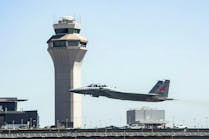Nov. 30—A U.S. Capitol riot suspect entered basic training at Joint Base San Antonio-Lackland in July and was later charged with attacking police during the Jan. 6 assault on Congress.
He was in training at the base for about three weeks, until the FBI questioned him and the Air Force kicked him out.
The Justice Department said Aiden Henry Bilyard, 19, of Cary, N.C., was charged with a variety of offenses. They include civil disorder; assaulting, resisting, or impeding certain officers using a dangerous weapon; destruction of government property, entering and remaining in a restricted building or grounds with a deadly or dangerous weapon, and "aiding and abetting" others in each of these crimes.
A criminal complaint filed Nov. 15 listed disorderly and disruptive conduct in a restricted building or grounds with a deadly or dangerous weapon; engaging in physical violence in a restricted building or grounds with a deadly or dangerous weapon; disorderly conduct in the Capitol grounds or buildings, and act of physical violence in the Capitol grounds or buildings.
He was arrested Nov. 23 in Raleigh, N.C., made his initial appearance in federal court in that state and was later released.
An Air Education and Training Command spokeswoman, Marilyn Holliday, said Bilyard entered basic training July 20 and was given an entry-level separation due to "erroneous enlistment" on Aug. 11.
The Air Force Recruiting Service said an initial background check done before Bilyard came to Lackland revealed nothing about his connection to the riot. Recruiters typically check with local law enforcement officials when conducting such reviews.
The FBI later identified Bilyard as a possible suspect in the riot while conducting a security clearance investigation for Bilyard's future job specialty in the Air Force, which officials could not immediately describe.
The AETC did not respond when asked if it knew of other recruits with links to the riot who have trained at Lackland.
In an emailed response to questions, Leslie Brown, a spokeswoman for the Air Force Recruiting Service, said potential recruits are asked about their past at several points, including a direct question during their initial appointment, "Have you ever had or currently have any association with extremist, hate organizations or gangs?"
Each applicant who enters the Delayed Entry Program at a military entrance processing station also gets a fingerprint scan, which is run through a federal database called BIRS, she said.
"If they have ever been fingerprinted for anything, a report is generated and loaded into our recruiting system. If an applicant has a record in BIRS, (the recruiting service) will not allow an applicant to ship to Basic Military Training (BMT) until the record has been reviewed and approved at the appropriate level," Brown said.
"In the case of Mr. Bilyard, his fingerprints were done in May 2021. The results didn't show any concerns. Prior to going to BMT, Mr. Bilyard was asked the extremist questions again, and again he said he had no association to any such organizations," she said.
The Justice Department cited court documents showing that Bilyard was among a crowd of rioters in the Lower West Terrace area of the Capitol at around 2:35 p.m. on Jan. 6, holding what appeared to be a large, gold-colored canister.
Federal authorities said video footage depicted Bilyard pointing the nozzle of the canister toward a line of uniformed law enforcement officers attempting to secure the building and spraying an orange-colored liquid at them, a chemical irritant believed to be "bear spray."
Later in the afternoon, at around 4:10 p.m., Bilyard was seen on video with a group that had gathered in front of a large glass window outside the Capitol. Images show him wearing a Harvard University sweatshirt, prompting some on Twitter to give him the hashtag #harvardsweats.
He encouraged a person who was striking the window with what appeared to be a small ax, authorities said. Someone handed Bilyard a bat and he used it to shatter the lower part of the window, then entered a Senate room through it, the Justice Department said.
Short of a criminal history, the armed services have few ways to identify recruits associated with extremist violence before they enter boot camps around the country, said Eugene Fidell, a senior research scholar at Yale Law School.
"It may not be practicable," he said. "We'd need regiments of IT people monitoring the web and I don't know if, as a country, we're ready to do that or whether we should be ready to do that. It's a democratic country."
There are First Amendment issues in play as the Pentagon tries to counter "problems with radicals in the military," said Fidell, who noted troops have a right to their political viewpoints.
"The Pentagon has been quite alert to free speech issues since the Vietnam War. There were people who had 'Impeach Nixon' bumper stickers. What to do about that?" he asked. "Are these people bad news for unit cohesion? Have they done anything that really suggests ill intent, the likelihood of misconduct? It's a real challenge and I'm sure the Pentagon and its lawyers are working overtime to sort out these quite tricky free speech issues."
Bilyard is one of more than 675 people who have been arrested in nearly all 50 states for crimes related to the breach of the Capitol in the 10 months since Jan. 6. That number includes more than 210 people charged with assaulting or impeding law enforcement.
Some of those accused of violence at the Capitol have come from the San Antonio area. Matthew Carl Mazzocco, 37, a loan officer from the Alamo City, was sentenced Oct. 4 to 45 days in jail and 60 hours of community service.
Bilyard's case is being prosecuted by the U.S. Attorney's Office for the District of Columbia and the Department of Justice National Security Division's Counterterrorism Section, with assistance from the U.S. Attorney's Office for the Eastern District of North Carolina.
___
(c)2021 the San Antonio Express-News
Visit the San Antonio Express-News at www.mysanantonio.com
Distributed by Tribune Content Agency, LLC.


